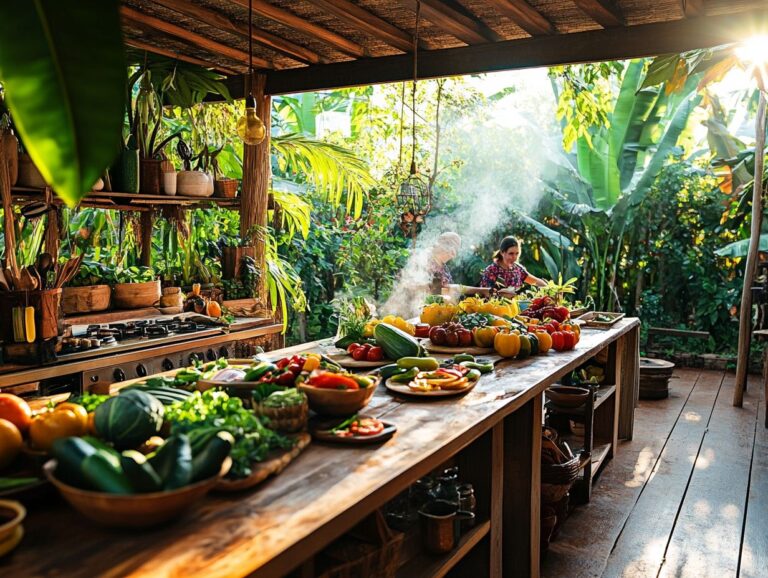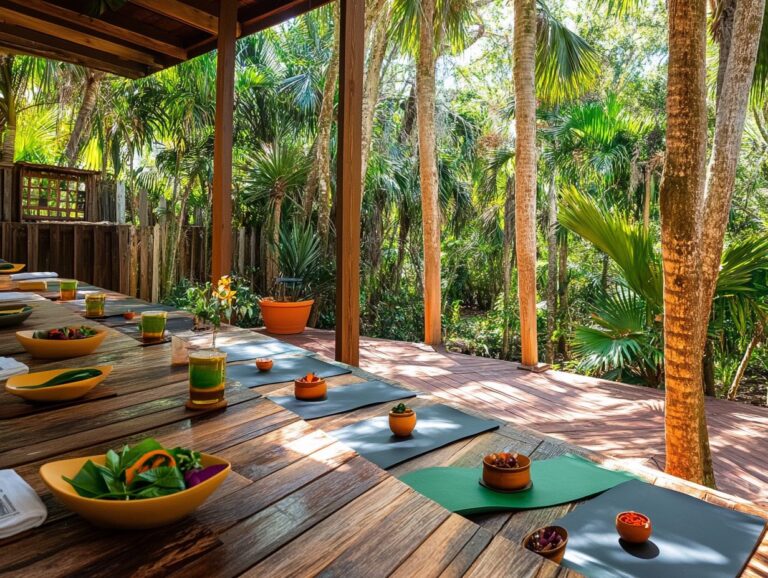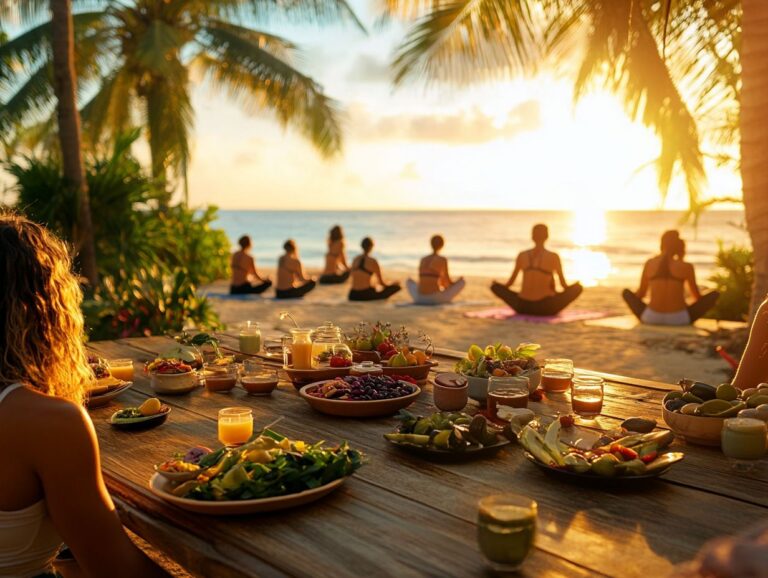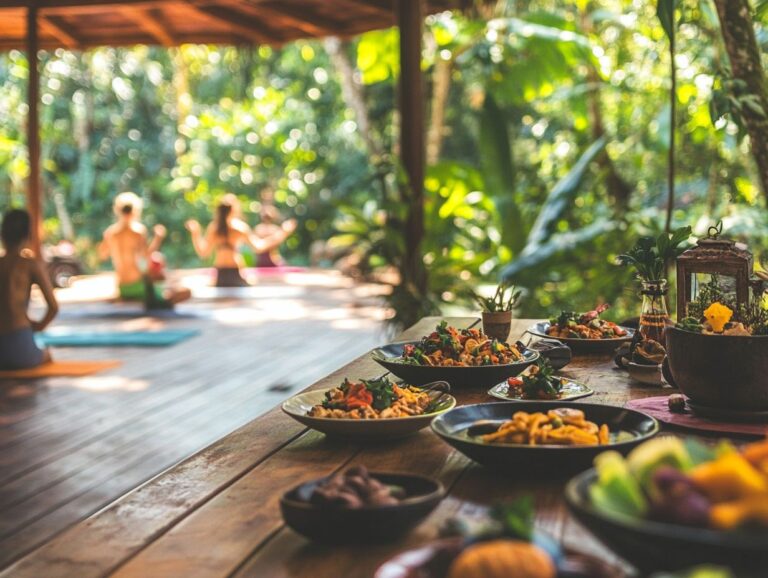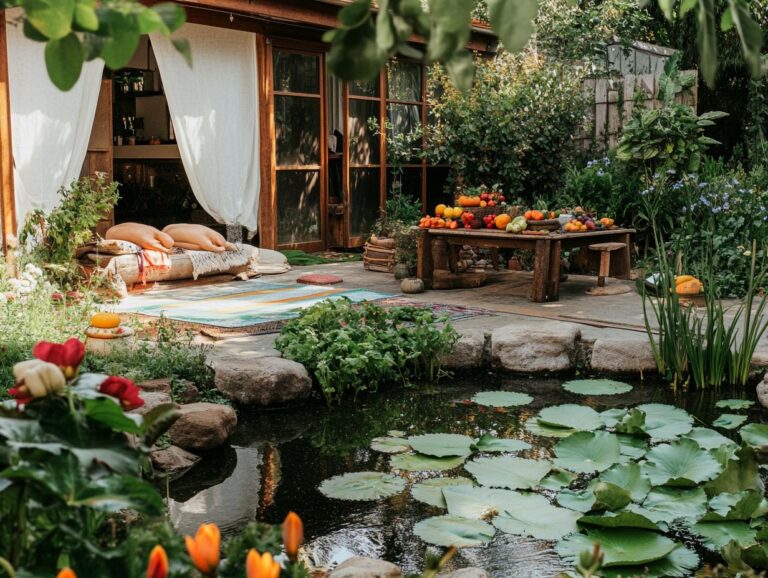Vegan cooking retreats are immersive experiences curated by Retreat Chef Academy for individuals eager to master plant-based cooking while connecting with nature and a community of like-minded individuals. As interest in veganism continues to grow, these retreats are gaining popularity, providing a unique combination of hands-on cooking classes, free-from cooking techniques, and farm-to-table dining experiences. Participants can expect to enhance their skills and knowledge through chef courses and intense learning experiences. This article delves into the benefits of attending a vegan cooking retreat, the plant-based tips participants can gain, and how to select the ideal retreat, such as Reclaim Yourself, for your culinary journey.
Key takeaway from these retreats includes acquiring knowledge in health and safety, insurance staffing, and becoming a culinary master. Participants often share positive student testimonials about their experiences at places like Bernie’s Bakehouse and Wild Food Cafe.
What Are Vegan Cooking Retreats?
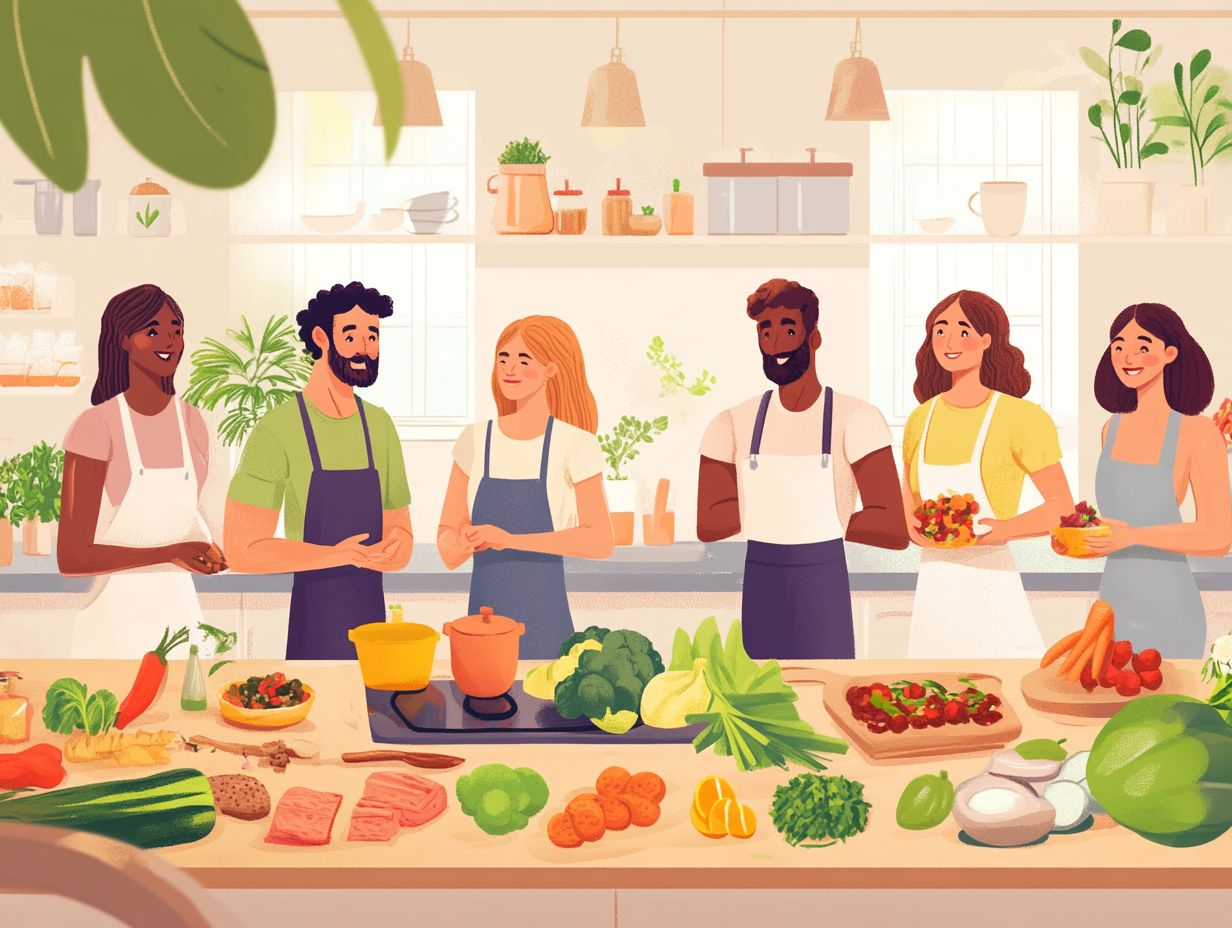
Vegan cooking retreats, such as those led by Bettina and Kirsten Huesch, are not just about recipes for yourself but also include kitchen management, menu planning, and sourcing local produce. These retreats often feature wellness professionals and can involve collaborations with renowned organizations like the NHS, UK.
At the Retreat Chef Academy, these retreats blend expert instruction with hands-on cooking classes led by culinary masters, creating an intensive learning environment that equips attendees with the skills and knowledge necessary to thrive in the plant-based culinary world.
Participants have the opportunity to learn from industry professionals, including renowned chefs like Kirsten Huesch and Carolina Briceno, while enjoying delicious recipes and meals that showcase the best of plant-based cuisine.
Why Are Vegan Cooking Retreats Gaining Popularity?
The growing popularity of vegan cooking retreats can be attributed to several factors, including the rising demand for plant-based diets, heightened awareness of health and safety benefits, and a desire for community engagement among wellness professionals and individuals alike.
The NHS in the UK emphasizes the importance of healthy eating, leading more people to seek holistic experiences that enhance their cooking skills and provide insights on establishing a successful plant-based business.
These cooking retreats foster a sense of community among participants, promoting knowledge sharing and cultivating a sense of belonging within the expanding plant-based movement.
What Are the Benefits of Attending a Vegan Cooking Retreat?
Attending a vegan cooking retreat offers several benefits, including the opportunity to learn new cooking techniques, discover a variety of plant-based recipes, and connect with like-minded individuals who share an interest in healthy eating and wellness.
These retreats provide an environment conducive to immersive learning experiences, allowing participants to acquire practical skills in free-from cooking, recipe development, and more.
By engaging in a plant-based cooking retreat, participants can enhance their culinary abilities while fostering a deeper connection to a community committed to promoting healthy living.
1. Learn New Cooking Techniques
One of the primary benefits of attending a vegan cooking retreat is the opportunity to learn new cooking techniques, particularly those suited for plant-based and allergen-free cooking styles. These retreats offer hands-on cooking classes that teach participants unique methods for successfully preparing flavorful and healthy plant-based meals.
Attendees are exposed to a variety of cooking techniques that elevate vegan cooking to a new level. For instance, fermentation allows participants to create tangy, probiotic-rich foods like kimchi or sauerkraut, which are beneficial for gut health and add an extra layer of flavor to meals.
Raw food preparations help participants discover how to use fresh fruits and vegetables in their natural state, preserving the nutrients and flavors of the produce. Workshops on gourmet vegan plating also teach presentation skills, transforming a basic meal into a visually stunning masterpiece and encouraging participants to experiment with new techniques in their own kitchens.
Practical tips, such as using a mandoline for achieving even vegetable cuts or how to brighten up a simple dish with a vibrant sauce, provide valuable takeaways that participants can apply when recreating these experiences at home.
2. Expand Your Culinary Repertoire

Participants at a vegan cooking retreat greatly expand their recipe repertoire by learning to prepare meals from breakfast to dinner using a variety of styles, cuisines, and plant-based ingredients. Under the guidance of expert chefs, attendees receive instruction on menu planning and sourcing ingredients.
Some examples of the vegan meals participants may learn to prepare include:
- Breakfast:
- Tofu scramble with mushrooms, spinach, and onions
- Gluten-free pancakes with maple syrup and fresh berries
- Chia seed pudding made with almond milk, banana, and nuts
- Smoothies featuring leafy greens, bananas, flaxseeds, and nut butter
- Lunch:
- Quinoa salad with black beans, corn, cilantro, and lime
- Pita bread served with hummus and vegetable sticks
- Lentil soup with carrots, celery, and spices
- Vegan sushi rolls filled with cucumber, avocado, and mango
- Dinner:
- Stir-fried vegetables with tofu and spices
- Cashew cream-based pasta with seasonal vegetables
- Barbecue jackfruit and corn tacos topped with avocado and salsa
- Stuffed bell peppers filled with brown rice, lentils, and herbs
- Thai green curry featuring eggplant, bamboo shoots, and basil
Cooking retreats inspire creativity, encouraging participants to experiment with flavors, textures, and colors in their vegan dishes. They learn to use seasonal ingredients, explore new techniques, and discover how to elevate simple everyday meals into restaurant-quality dining experiences.
3. Connect with Like-Minded Individuals
One of the most enriching aspects of vegan cooking retreats is the opportunity to connect with like-minded individuals, including wellness professionals and fellow cooking enthusiasts who share a common interest in plant-based living.
This sense of community is nurtured through shared experiences, engaging discussions, and collaborative cooking sessions. Attendees often find that these interactions can develop into lasting friendships and professional networks that extend well beyond the retreat itself.
Many past participants have recounted how the supportive atmosphere inspired them to forge connections that led to collaborative projects, ranging from recipe sharing to the establishment of pop-up restaurants. As one alumnus shared, “I came to the retreat looking for culinary skills, but I left with a network of passionate friends who inspire me every day.”
This communal experience not only enhances culinary skills but also cultivates a vibrant, supportive network that fosters both personal growth and professional opportunities.
What Can You Expect at a Vegan Cooking Retreat?
A vegan cooking retreat usually features hands-on cooking classes, interactive workshops on nutrition, and farm-to-table dining experiences that highlight the finest aspects of plant-based cooking.
Each day is packed with activities designed to enhance cooking skills while promoting overall health and wellness.
1. Hands-On Cooking Classes
Hands-on cooking classes are an essential component of vegan cooking retreats, playing a vital role in teaching participants plant-based techniques while enhancing their culinary skills in a supportive environment.
These classes cover a wide range of topics, from basic preparation to advanced cooking techniques. Participants can expect to learn how to create healthy lentil stews, vibrant grain bowls, and indulgent no-dairy desserts.
Essential culinary skills such as knife skills, flavor profiling, and ingredient substitution are taught to help build participants’ confidence in the kitchen.
Additionally, hands-on cooking classes often introduce plant-based methods like fermentation and sprouting, which can be easily integrated into everyday meals.
By practicing these techniques in a hands-on setting, participants not only learn recipes but also discover how to live sustainably. This transforms the daily task of cooking into an exciting adventure filled with creativity and wellness.
2. Nutritional Workshops and Seminars
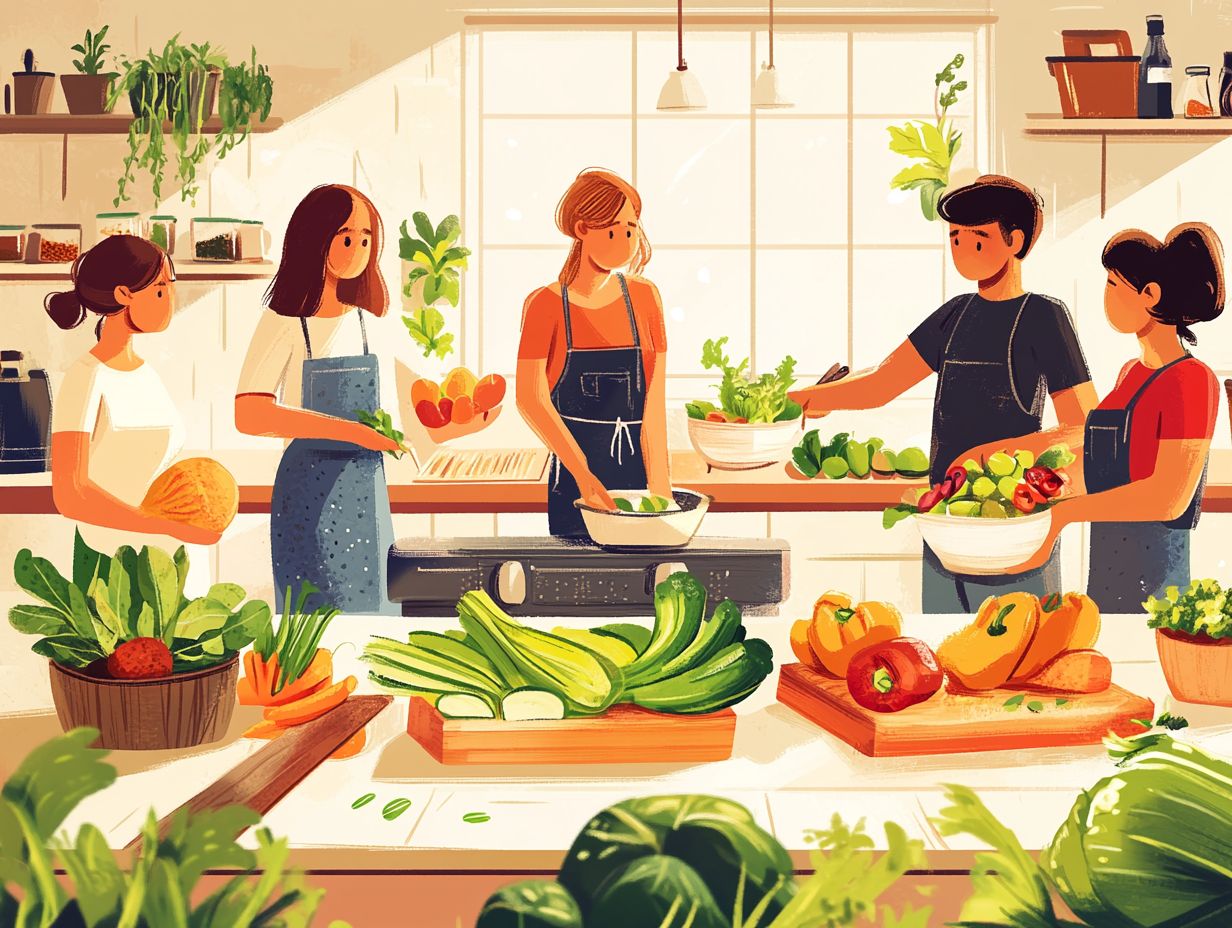
Vegan cooking retreats also include nutritional workshops and seminars that highlight the health benefits of a plant-based diet. These sessions are conducted by wellness professionals who provide valuable insights into nutrition and healthy eating practices, helping participants learn how to create balanced meals and improve their overall health.
Through group discussions and practical exercises, participants explore various aspects of nutrition, food sourcing, and meal planning, which are essential for adopting a plant-based lifestyle. Attendees leave with a collection of recipes and a framework for making healthier choices at home, thereby transforming their cooking habits.
The emphasis on plant-based nutrition forms a key component of the retreat’s overall experience and fosters a supportive community of like-minded individuals who encourage one another to embrace enjoyable and sustainable healthy diets.
3. Farm-to-Table Dining Experiences
Farm-to-table dining experiences are a highlight of many vegan cooking retreats, emphasizing the importance of sourcing local produce and creating delicious plant-based meals that celebrate seasonal ingredients.
These experiences often feature dishes crafted by culinary masters who prioritize sustainability and flavor. Participants have the unique opportunity to engage directly with local farmers, gaining firsthand knowledge about growing practices and the meticulous care involved in producing fresh, organic vegetables.
This interaction not only deepens their appreciation for the food on their plates but also fosters a sense of community and a commitment to supporting local economies.
Throughout these meals, the connection to the cooking classes becomes evident as attendees apply the skills they have learned in the kitchen, from knife techniques to flavor pairings. Each bite tells a story of the land, the labor, and the love that contribute to sustainable living and healthy eating.
4. Outdoor Activities and Excursions
Many vegan cooking retreats also incorporate outdoor activities and excursions, allowing participants to connect with nature and enhance their overall wellness.
These activities may include guided nature walks, visits to local organic farms, and tours of artisanal producers, which enrich the educational experience of the retreat.
Experiential learning helps participants engage with their environment and raises awareness of sustainable practices, such as foraging for wild herbs and vegetables that can be utilized in their cooking workshops.
Workshops on gardening techniques enable individuals by teaching them how to grow their own plant-based ingredients at home, reinforcing the idea that wellness starts with fresh produce.
Additionally, group hikes or cycling excursions foster community and camaraderie among participants, deepening their relationships as they appreciate the beauty of nature together.
This holistic approach to the retreat harmonizes with the culinary education offered and encourages participants to embrace a more integrated and fulfilling plant-based lifestyle.
How to Choose the Right Vegan Cooking Retreat for You?
When choosing a vegan cooking retreat, it’s essential to consider factors such as location and setting, duration and schedule, instructors and guest chefs, as well as cost and inclusions.
These aspects are crucial to ensure that the retreat aligns with your culinary and personal goals.
1. Location and Setting

The location and setting of a vegan cooking retreat are crucial as they influence the atmosphere, accessibility, and types of culinary experiences provided. A natural and scenic environment can enhance the educational aspects of the retreat and promote overall well-being and relaxation.
When selecting a retreat, participants should consider their own preferences; some may prefer a tranquil countryside setting surrounded by nature, while others might enjoy the vibrancy and diverse influences of an urban culinary hub.
Each environment presents unique opportunities: a peaceful countryside retreat may offer more farm-to-table experiences, whereas an urban setting could provide dynamic workshops led by talented chefs. The landscape and ambiance not only establish a certain mood but also affect participants’ levels of concentration and creativity, allowing them to fully engage in vegan cooking.
Ultimately, choosing a location that aligns with participants’ values and desires can help ensure the retreat becomes a transformative experience.
2. Duration and Schedule
The duration and schedule of a vegan cooking retreat are important factors that determine the time commitment required and shape the overall experience. Some vegan cooking retreats last just a weekend, while others can extend for a week or more. These varying durations offer different levels of commitment and educational experiences.
For individuals looking to learn a few key ideas and practices in a limited timeframe, a shorter vegan cooking retreat may be more suitable, especially for those who cannot dedicate time to a longer program. However, opting for a brief retreat often means missing out on the deeper learning that longer retreats provide.
The length of the retreat significantly affects the depth and breadth of food education offered; shorter retreats may focus on surface-level content, whereas longer retreats can delve into richer experiences encompassing cooking techniques, ingredients, and the philosophy of vegan cooking.
While shorter weekend retreats may appear to be better options for those with busy schedules, they typically lack the comprehensive learning experience of longer, immersive programs. A well-structured schedule can enhance learning opportunities during the retreat, enabling participants to concentrate on developing their skills and building relationships with others who share their passion for plant-based cooking.
3. Instructors and Guest Chefs
The instructors and guest chefs at a vegan cooking retreat significantly influence the learning experience, as their skills and teaching methods directly affect participants’ ability to develop new skills and confidence in plant-based cooking.
Interaction with these culinary masters provides valuable lessons. Researching the backgrounds and experiences of the instructors and guest chefs allows prospective participants to understand how their unique approaches and philosophies contribute to the overall experience.
This understanding inspires creativity and encourages experimentation with various techniques and ingredients. Instructors with diverse culinary journeys often share personal stories, enriching discussions and fostering a vibrant learning environment.
Participants not only learn how to prepare delicious vegan recipes but are also inspired by the personal anecdotes and journeys of experienced chefs, which further enhances their culinary skills.
4. Cost and Inclusions
Assessing the cost and inclusions of a vegan cooking retreat is essential for ensuring that it aligns with your financial constraints while maximizing your value for money.
Consider what the price covers, such as accommodation, provided meals, workshops, and any additional activities or excursions.
Along with understanding what is included, it’s equally important to be aware of what may not be included. There could be hidden fees that you should discuss with the retreat organizers.
For instance, some retreats may charge extra for special classes or one-on-one instruction, or there might be additional costs for certain ingredients that are not factored into the retreat’s price.
To make a well-informed decision, it’s advisable to compare several options, looking not only at the final price but also at the overall value each retreat offers. This includes evaluating the quality of instructors, the variety of classes, and the overall experience.
By understanding these factors, you can ensure that a specific retreat falls within your budget and is worth the investment.

